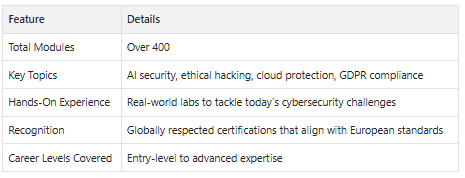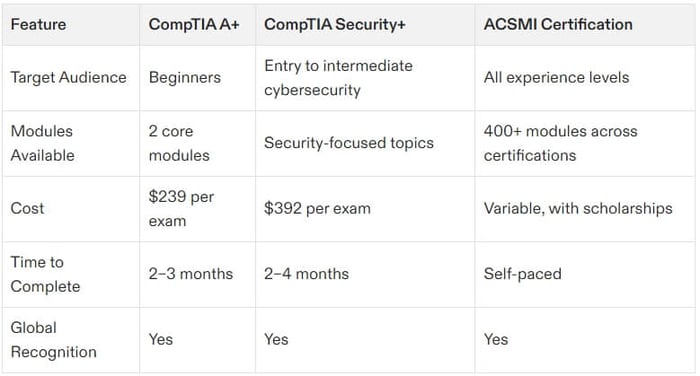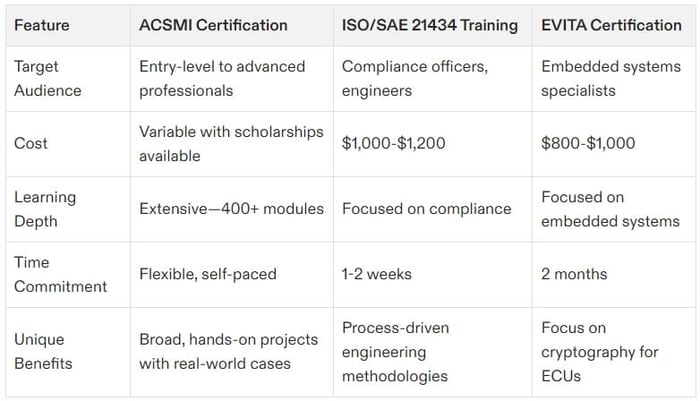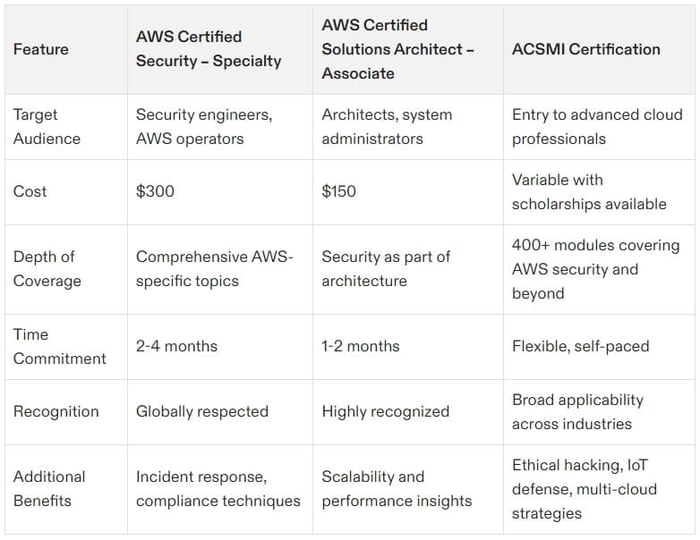Table of Contents
- Why Cybersecurity Certifications Are Essential in Europe
- Popular Cybersecurity Certifications in Europe
- The Benefits of Earning a Cybersecurity Certification Europe
- How to Prepare for Cybersecurity Certification Europe
- Career Paths With a Cybersecurity Certification in Europe
- ACSMI Certification Modules
- FAQs
- Final Thoughts
Europe is at the forefront of digital transformation, with businesses and governments increasingly reliant on cutting-edge technologies. However, as the digital world grows, so does the risk of cyber threats. To address these challenges, cybersecurity professionals are in high demand, making a cybersecurity certification Europe a vital tool for career advancement in the tech sector.
Whether you’re entering the cybersecurity field or are an experienced professional, obtaining the right certification can significantly boost your career.
Why Cybersecurity Certifications Are Essential in Europe
Europe’s tech ecosystem is robust and diverse, spanning industries like finance, health care, transportation, and energy. With new regulations such as GDPR (General Data Protection Regulation) and the NIS2 Directive on cybersecurity, organizations must comply with stringent security standards.
Obtaining a cybersecurity certification Europe equips you with the skills and credentials required to meet these regulatory needs. Beyond compliance, certifications boost your employability and earning potential by showcasing your expertise.
Some key reasons to pursue cybersecurity certification in Europe include:
- High Demand for Specialists: With cyberattacks on the rise, companies and governments are actively hiring certified security professionals.
- Attractive Salaries: Certified professionals consistently earn significantly higher salaries in Europe compared to those without certifications.
- International Recognition: Many certifications are globally respected, empowering you to pursue opportunities across borders.
- Technological Advancement: Certifications provide the cutting-edge knowledge required to address emerging threats.
Popular Cybersecurity Certifications in Europe
Choosing the right cybersecurity certification is critical to your career success. Below are some of the most highly regarded certifications available in Europe.
1. Certified Information Systems Security Professional (CISSP)
CISSP is a globally recognized standard for cybersecurity professionals. It’s ideal for specialists looking to advance into leadership roles in risk management and system design.
2. ISO 27001 Implementer and Auditor Certifications
Europe places a major focus on adherence to the ISO 27001 standards. Certifications in this area are highly sought after by professionals who work in compliance and auditing.
3. Certified Ethical Hacker (CEH)
The CEH certification is tailor-made for those interested in penetration testing and ethical hacking. It’s particularly valued in industries like e-commerce and banking.
4. CompTIA Security+
This is an excellent starting point for beginners, focusing on foundational cybersecurity skills. It’s recognized throughout Europe and is often a prerequisite for advanced certifications.
5. ACSMI Certifications
ACSMI offers over 400 comprehensive modules designed to develop both foundational and advanced skills in cybersecurity. Their certifications emphasize real-world readiness, enabling individuals to tackle modern-day security challenges effectively. Discover their training programs here.
The Benefits of Earning a Cybersecurity Certification Europe
1. Improved Job Prospects
With certifications, you demonstrate your proficiency to employers. Many roles in Europe now list specific certifications as mandatory qualifications.
2. Higher Earning Potential
Certified professionals often earn 20–40% more than their uncertified counterparts. Specialized certifications such as CISSP or CEH can unlock even higher earning opportunities.
3. Adaptability in a Growing Industry
The digital world is constantly evolving. A cybersecurity certification Europe ensures you stay updated with the latest technological trends and regulations.
4. Job Security
Cybersecurity professionals are indispensable in today’s tech-driven economy. A respected certification enhances your job security, even during economic downturns.
5. Recognition Across Europe
Certifications often align with European standards, making it easier to pursue high-level roles in other EU countries.
How to Prepare for Cybersecurity Certification Europe
Successfully earning a certification requires both theoretical knowledge and practical experience. Follow the steps below to optimize your study process and increase your chances of success.
1. Understand Certification Requirements
Research the pre-requisites, syllabus, and exam format of your chosen certification. This helps you focus your study efforts effectively.
2. Leverage Technology
Study aids like cybersecurity quizlets can strengthen your grasp of theoretical concepts.
3. Enroll in Practical Training Courses
Platforms like ACSMI bridge theory with practice by offering scenario-based training. Their 400+ module library covers everything from basic cybersecurity skills to advanced tactics like malware analysis. Get started here.
4. Practice Problem-Solving
Real-world challenges are crucial to success. Use labs and simulations to hone your problem-solving skills.
5. Join a Study Group
Engaging with like-minded learners creates a collaborative environment that boosts motivation.
Career Paths With a Cybersecurity Certification in Europe
The rising wave of cyber threats across industries in Europe has created a diverse array of opportunities for cybersecurity professionals. A cybersecurity certification Europe not only validates expertise but also carves a pathway to high-demand roles with impressive salary packages. Here’s a look at some of the most promising career paths in Europe for certified experts:
1. Cybersecurity Analyst
Cybersecurity Analysts are the frontline defenders, responsible for monitoring systems, identifying threats, and mitigating vulnerabilities. Certifications like CISSP or CompTIA Security+ equip professionals with the skills needed to excel in this role.
Demand in Europe: With more businesses digitalizing operations, the need for analysts is skyrocketing, especially in tech-heavy sectors like finance and healthcare.
Salary Potential: €50,000–€80,000 annually, with variations depending on location and expertise.
2. Penetration Tester (Ethical Hacker)
Penetration Testers, also known as Ethical Hackers, carry out simulated attacks to uncover system weaknesses before malicious actors can exploit them. Certifications like CEH or Offensive Security Certified Professional (OSCP) are highly valued in this niche.
Demand in Europe: Industries like banking, e-commerce, and government demand skilled professionals to secure their systems against potential breaches.
Salary Potential: €60,000–€100,000 annually, with potential performance bonuses.
3. Compliance Auditor
Compliance Auditors ensure companies meet European Union standards such as GDPR and ISO 27001. They play an integral role in helping organizations avoid hefty fines and safeguard sensitive data.
Demand in Europe: Growing data protection laws and increased regulatory pressures have made this role indispensable across industries.
Salary Potential: €70,000–€120,000 annually, particularly for auditors specializing in cross-border compliance.
4. Cloud Security Specialist
Cloud Security Specialists focus on securing data and systems hosted on cloud platforms as businesses increasingly migrate operations online. Certifications emphasizing cloud technologies, like ACSMI’s Cloud Security modules, are integral to this career path.
Demand in Europe: The rise in remote work and adoption of cloud solutions have highlighted the critical importance of cloud security experts.
Salary Potential: €65,000–€110,000 annually, with opportunities to lead in cloud deployment projects.
5. Incident Response Manager
Incident Response Managers oversee cybersecurity teams and coordinate efforts during and after cyberattacks. Advanced certifications in risk management and incident response, such as CISSP or advanced ACSMI modules, are essential for success in this role.
Demand in Europe: This role is particularly sought after in larger corporations and government agencies, where security breaches can lead to catastrophic losses.
Salary Potential: €80,000–€150,000 annually, depending on the scope of responsibility.
ACSMI Certification Modules
FAQs
1. Why is a cybersecurity certification important in Europe?
With rising cyber threats and compliance requirements like GDPR, certifications validate your expertise and make you highly employable.
2. What is the best certification for beginners in Europe?
CompTIA Security+ is an excellent starting point for those new to the cybersecurity field.
3. Can I combine certifications?
Yes, combining theoretical certifications like CISSP with hands-on training from ACSMI enhances your expertise.
4. How does ACSMI help prepare for certifications?
ACSMI’s 400+ modules provide scenario-based training, ensuring real-world readiness.
5. Where can I access ACSMI’s cybersecurity training modules?
You can access ACSMI’s comprehensive training platform here.
Final Thoughts
Earning a cybersecurity certification Europe is your gateway to a promising career in this dynamic and high-demand field. With Europe’s growing investment in digitalization and data security, certified professionals can enjoy lucrative roles, international recognition, and job stability.
To stay competitive, it’s essential to combine foundational knowledge with real-world experience. Training platforms like ACSMI, with their extensive modules and practical focus, offer the ideal solution for aspiring cybersecurity experts. Start your certification prep today with ACSMI’s cutting-edge resources and unlock your full potential!





